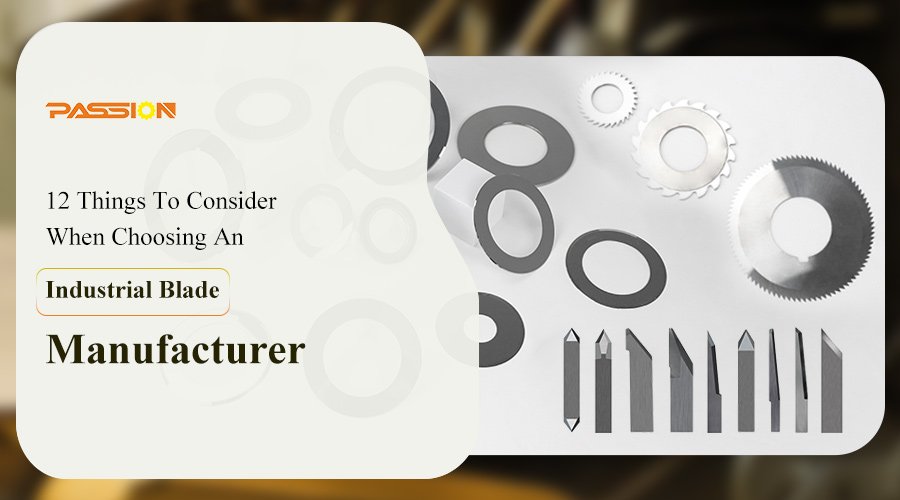Wide range of blade materials
Different application scenarios, there are different ideal blade materials, but are inseparable from the two core elements – hardness and toughness. As we all know, the higher the hardness of the blade material usually have better wear resistance and resistance to deformation, good toughness of the material can reduce the blade fatigue fracture and cracks. For example, the more widely used material in the current slitting blade is carbide, which has high hardness and wear resistance, but due to the lack of toughness, easy to fracture, so balancing the hardness and toughness of the blade to maximize the performance of the blade is an excellent blade maker should have the core competence.
Below is a list of some of the common materials used in the industrial blade industry:
High-carbon
Stainless steel
Solid carbide
Ceramic
52100 high-carbon chromium alloy steel
M-2 molybdenum high-speed steel
D-2 air-hardening, high-chromium tool steel
CPM 10V high-vanadium tool steel
Tungsten carbides
High speed steels
Wide range of blade types
A good industrial blade manufacturer should provide the exact blade profile according to the customer’s application scenario, including some non-standard parts blade designs. PassionBlade can provide a wide range of different blade types to fulfill the customer’s use in different equipments.
Below are the common types of blades offered by PassionBlade:
Circular knives: One of the most common industrial blades used in many industries from textile to food processing.
Cutoff knives: Toothed blades designed to cut cleanly through a range of materials from foam to foils.
Straight knives: Straight-edge blades that provide a clean cut, score or slice within food processing or manufacturing applications.
Tray knives: Specialty knives that provide high-precision and efficiency customized to your needs.
Slitter knives: Beveled blades that have either a straight edge or teeth for making precision slits in paper or plastic products.
Guillotine knives: Cutoff knives used in repetitive swing-style processing and manufacturing operations.
Perforating knives: Specialty knives that puncture materials against a backing and perform repeated cuts for a set length.
Professional edge design
Blade edge type determines its basic function, different cutting needs match different blade edges. A reasonable blade edge can improve productivity, and an industrial blade manufacturer that can provide a wide range of blade edges will make your business easier.
The following are some common forms of blade edges.:
Straight
Serrated
Scalloped
Beveled
Square Edge
Bevel edge single, double, blunt or sharp
Double sharp or blunt
Double single blunt or sharp
Double double blunt or sharp
Toothed edge with a standard V, vari depth V or hi/low V
Clever application of coatings
When cutting some sticky items, such as adhesive tapes, it is often necessary to protect the blade from adhesive sticking to the blade by coating the blade. Coating not only improves scratch resistance and reduces drag, but also prevents corrosion and extends the life of the blade.
Common coatings are listed below:
Titanium Nitride Coating
Teflon Black Nonstick Coating
Titanium Carbon Nitride (TiCN)
Hard Chrome
Diamond-Like Carbon Coating (DLC)
Poly Tetra Fluoro Ethylene (PTFE)
Electroless Nickel Plating
Extensive industry experience
A comprehensive industrial blade manufacturer does not specialize in one particular application like some small factories do. The comprehensive industrial blade manufacturer not only offers a wide range of industrial blades to solve different cutting needs for customers, but also understands the details of many different industrial applications and the precise blade needs for each application. Its extensive industry experience and understanding of the process cannot be matched by the average small factory and middleman.
Some of the industries that PassionBlade has served over the past 15 years:
Cigarette Manufacturing industry
Paper and corrugated cardboard industry
Leather and textiles industry
Rubber and plastic industry
Woodcutting industry
Carpet and brush industry
Food processing industry
Medical operations industry
Packaging and printing industry
Metal, manufacturing and converting industry
Quality Assurance
It’s not just the product that needs attention when choosing an industrial blade manufacturer, but also the manufacturer’s reputation. Whether or not you can guarantee consistent quality over time is a true test of a manufacturer’s reputation, and reputable industrial blade manufacturers have reliable quality assurance processes in place to ensure that they can provide customers with safe, durable, sharp, and efficient blades every time, which meet the high standards that customers expect. As a customer, it’s important to understand a manufacturer’s quality assurance process so that you can be confident in the products you purchase.
Precision Manufacturing Process
Different cutting scenarios require industrial blades made of different materials, and the manufacturing process of industrial blades made of different materials is not the same, for example, high-speed steel type blades usually need to be cut and shaped through heat treatment and other techniques, while carbide types need to be mixed with tungsten, cobalt and other rare metal powders in a certain ratio, pressed, sintered into blanks and then finished into the final product. The mastery of these processes often determines the scope and cost of a manufacturer’s blades.
At PassionBlade, we routinely utilize several different precision manufacturing processes, depending on the type of blade involved:
Water jet cutting, which uses a high pressure stream of water up to 50,000 psi to slice through the metal and contour the blade.
Laser cutting technology, which uses amplified light to cut metal blanks. Rather than physically cutting the metal or material directly, the laser beam melts its surface and cuts through the material in its cross-section to create a smooth cut.
Wire cutting technology, which uses a moving metal wire (molybdenum, copper or alloy wire) as the electrode wire, relying on the electrode wire and the workpiece between the pulse electric spark discharge, resulting in high temperatures so that the metal melted or vaporized to form a slit, so as to cut the blade profile.
Sintered grinding technology, through the powder metallurgy process, the refractory metal hard compounds (such as tungsten, cobalt, etc.) and the bonding metal mixed in a certain proportion, and then pressed through the mold, sintering and shaping.
Flexible order quantity
In many cases, industrial blade manufacturers require businesses to order a certain minimum quantity in order to meet customization requirements. For businesses that have different blade needs at different times, whether you’re a small company or a large corporation, when the blade manufacturer you’re working with offers flexible order quantities, order quantities that can be scaled up with the needs of your business will make it easier for you to do business.
Stocking order capability
The ability to stock orders is a key consideration in the overall capabilities of a blade manufacturer, and a manufacturer that can stock the amount of blades you need can deliver them to you faster than a company that needs to make blades from scratch. The time saved on new blade orders can have a significant impact on your business operations.
Fast after-sales response
Businesses can’t afford unproductive downtime in their manufacturing or machining operations. When you need new or replacement blades, you need to rely on a manufacturer that has the expertise and equipment and a team that can respond quickly. Larger manufacturers generally have teams of experienced engineers who can solve your industrial blade problems more quickly than many small workshops.
Customization capabilities
The ability to customize has become the core engine of competitiveness for blade manufacturers. It is not just a change in production methods, but also a precise capture of market demand and rapid response. A blade manufacturer with strong customization capabilities is like having a magic wand that can be used in a variety of ways to create a perfect fit for a customer’s unique needs.
Free Samples
Free samples are a common way that industrial blade manufacturers offer businesses to find the best blades. Finding the perfect blade that can cut a given material smoothly requires specialized knowledge and experience. When your business involves cutting new materials, it’s crucial to find a specialty knife manufacturer that can provide you with free samples and can design the best material, profile, and edge configuration for your machine knives based on your needs.
These are at least 12 things you need to consider when you are choosing an industrial blade manufacturer. PassionBlade has been in the industrial blade industry for 15 years and has a lot of experience in the industry. It has its own factory to produce blades and has a group of professional team. If you have any questions about industrial blades please feel free to contact us at email: lesley@passiontool.com or WhatsApp: +86 186 2803 6099.



